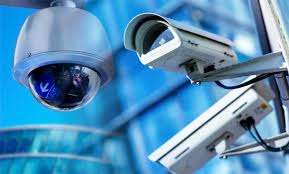British police forces are still relying heavily on Chinese-made CCTV camera technology despite security and ethical concerns about the companies that produce them, says the Biometrics and Surveillance Camera Commissioner (OBSCC). A survey of police forces and other bodies released today reveals at least 24 are using internal camera systems from vendors such as Hikvision that have been flagged as potentially problematic.
Commissioner Fraser Sampson wrote to the chief officers of all 43 geographical police forces in England and Wales, as the Ministry of Defence, British Transport Police, the National Crime Agency, and the Civil Nuclear Constabulary, to get a picture of their camera use. Of those, 39 forces and public bodies responded. The survey found that 18 used external cameras from questionable sources and 11 used automatic number plate recognition systems (ANPR) that were subject to concerns.
When the same survey was carried out in 2017 and 2019 the response rate was 100%. This time it was 91%, with no response coming from Greater Manchester Police, Merseyside Police or the National Crime Agency (NCA). Sampson’s survey asked a broad selection of questions about the use of surveillance technology including ANPR, CCTV, body-worn video, drones, facial recognition, helicopter-borne cameras, and other relevant systems within the scope of the OBSCC.
For every type of technology, apart from the helicopter-borne cameras and facial recognition, at least one of the police forces was using devices manufactured or supplied by a foreign company that has had a security or ethical alert issued against them, the report found, with respondents saying they need further guidance on what to do with existing technology.
In November 2022 Oliver Dowden declared that cameras made by Hikvision and other similar Chinese-owned companies can no longer be installed in or on government buildings. He called them a “current and future possible security risk”. Hikvision is partly owned by the Chinese government and is the largest CCTV provider in the world.
There have been growing calls for a ban on their use, particularly in sensitive and high-security areas, in part due to Hikvision’s alleged role in aiding Chinese oppression in the Xinjiang province and Tibet. Big Brother Watch’s report alleged that Hikvision and Dahua have participated in China’s oppression of the Uyghur community in Xinjiang.
Despite this, Hikvision’s cameras can be found in schools, police stations and even secret laboratories in the UK, supplying up to 60% of UK public bodies with CCTV. The government banned the future installation of the cameras, called for the removal from core computer networks and “remove them altogether where possible”.
Lack of CCTV guidance
The problem, according to Sampson, is that further clarification of their use when already installed is needed from the government. He wrote in the report: “A number of respondents stated that there was a need for further guidance to be issued around the use of existing technology where there are security and/or ethical concerns around its source, although they did not make any suggestions as to who should issue it.”
Thirty-nine responses were received out of a possible total of 47. Key findings include that:
at least 18 respondents say that their external camera systems use equipment about which there have been security or ethical concerns (including Dahua, Hikvision, Honeywell and Huawei, and Nuuo)
at least 24 respondents say that their internal camera systems use equipment about which there have been security or ethical concerns (including Dahua, Hikvision, Honeywell and Huawei, and Nuuo) at least 11 respondents say their ANPR systems use equipment about which there have been the security or ethical concerns at least 2 respondents use cameras made by Hikvision in their body-worn video systems
23 of the 31 respondents who said they operate cameras on drones / unmanned aerial vehicles (variously with video, audio, and thermal imaging and/or night vision capability), said they were aware of security or ethical concerns about the manufacturer of their drones, a Chinese company, DJI
Biometrics and Surveillance Camera Commissioner Fraser Sampson said:
It is abundantly clear from this detailed analysis of the survey results that the police estate in the UK is shot through with Chinese surveillance cameras. It is also clear that the forces deploying this equipment are generally aware that there are security and ethical concerns about the companies that supply their kit.
There has been a lot in the news in recent days about how concerned we should be about Chinese spy balloons 60,000 feet up in the sky. I do not understand why we are not at least as concerned about the Chinese cameras 6 feet above our heads in the street and elsewhere.
Clearly, it is vital sometimes that the police must be able to use intrusive surveillance technology in public places. But if they want the public to trust them to do so, they must be able to persuade us, not only that they are working partners and providers that can be trusted, but also that they will use the technology available to them lawfully, responsibly and according to a set of clear agreed principles.
Parliament has already acted to curtail the use of equipment made by several Chinese manufacturers from some areas of public life where security is key. I and others have been saying for some time that we should, both for security and ethical reasons, really be asking ourselves whether it is ever appropriate for public bodies to use equipment made by companies with such serious questions hanging over them.
The OBSCC sent the survey to the chief officers of the 47 policing bodies in June 2022. The document followed the format of earlier surveys conducted by the Surveillance Camera Commissioner in 2017 and 2019. The response rates for previous surveys had been 100%, but the rate for the 2022 survey fell to 91% (39 out of a possible 47) despite responses being accepted more than 3 months after the initial deadline.
The survey report notes that the 2022 return was “disappointing [with] some noticeable absences in returns this time, including some of the larger police forces.”
A list of the bodies that did respond is included in an appendix at the end of the report. The 8 which did not complete the survey were: the City of London Police, Gloucestershire Police, Greater Manchester Police, Gwent Police, Merseyside Police, National Crime Agency (NCA), South Yorkshire Police, and Thames Valley Police.

